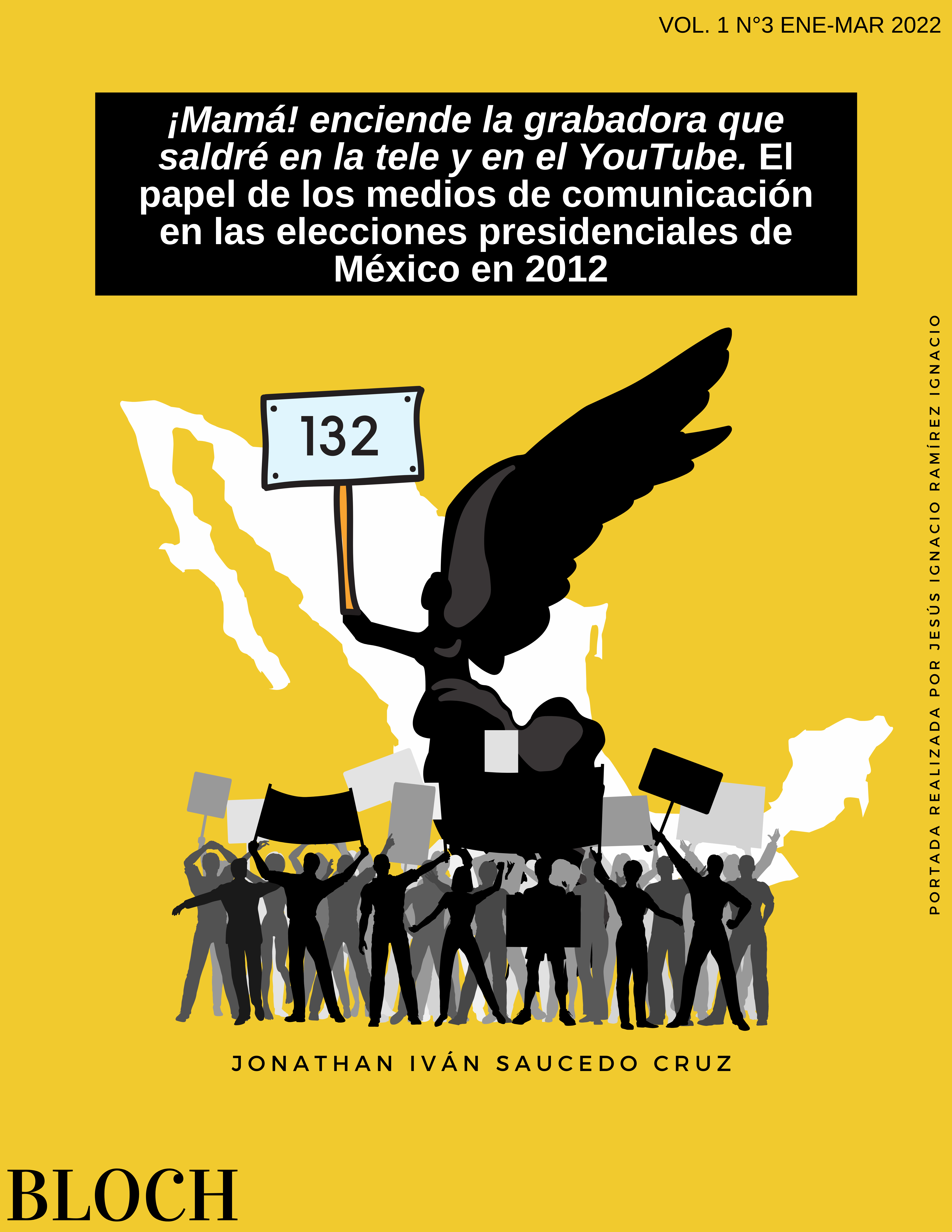Mom! Turn on the recorder, I'll be on TV and on YouTube. The role of the media in the presidential elections of Mexico in 2012

Published 2022-01-31
Keywords
- Peña, government, media, #YoSoy132, voting, politics, INE, democracy, Twitter, Mexico, TV, internet
How to Cite
Copyright (c) 2022 Jonathan Iván Saucedo Cruz

This work is licensed under a Creative Commons Attribution 4.0 International License.
Abstract
In Mexico, disputes between parties have always given a lot to talk about from different periods in political history, so that elections are usually a turning point full of scandals and corruption. This paper highlights specific affairs that occurred in the 2012 elections and the different ways in which information was distributed through traditional media such as television, as well as emphasizing how the internet and social networks influenced everything in this electoral process.
Downloads
References
- Bermúdez, D. (2018, 20 de noviembre). Las elecciones en Twitter: 2012 vs 2018. El economista. Recuperado de: https://www.eleconomista.com.mx/empresas/Las-elecciones-en-Twitter-2012-vs.-2018-20180607-0099.html
- Capizo, J. (1985). El presidencialismo mexicano. México: Siglo veintiuno.
- Carroll R. (2012). Mexican media scandal: Televisa condemns Guardian reports. The Guardian. https://www.theguardian.com/media/2012/jun/27/mexico-media-scandal-televisa-condemns-guardian-report-intimidating
- Carroll R, Tuckman J. (2012). Spotlight falls on Televisa, Mexico's all-powerful TV station. The Guardian. https://www.theguardian.com/world/2012/jun/26/spotlight-televisa-mexico-tv-station
- Domínguez, R. (2014). Los debates presidenciales de 2012 y su contribución a la cultura política. Instituto Tecnológico y de Estudios Superiores de Monterrey. http://www.redalyc.org/articulo.oa?id=68731036001
- Fernández, C. (2012). Twitter y la ciber política. Anuario Electrónico de Estudios en Comunicación Social "Disertaciones". http://erevistas.saber.ula.ve/index.php/Disertaciones
- Gómez, S. (2017). La cultura política de los jóvenes. México: El colegio de México.
- González, R. (2016.). #YoSoy132. Acontecimiento y Devenir. La izquierda mexicana del siglo XX. Distrito Federal. Universidad Autónoma de México
- Pazos, L. (2017). EPN: El retroceso. México: Diana.
- Redacción AN. (2012). ¿Cómo operaba la unidad secreta de Televisa? Aristegui Noticias. https://aristeguinoticias.com/2706/lomasdestacado/como-operaba-la-unidad-secreta-de-televisa/
- Saldierna, G., Aranda, J., & Muñoz, A. (2012). El tercer debate, sin cambios; reiteran candidatos sus propuestas de campaña. La Jornada. https://www.jornada.com.mx/2012/06/20/politica/004n1pol
- Salgado, E. (2013). Twitter en la campaña electoral del 2012. Centro de Investigaciones y Estudios Superiores en Antropología Social. http://www.scielo.org.mx/scielo.php?script=sci_arttext&pid=S1607-050X2013000200013
- Sánchez, C. (2013.). El significado actual de la rebelión estudiantil de 1968. Más allá del liberalismo. En Otras voces y otros hechos del 68. 45 años después. Distrito Federal: DGPyFE-UNAM; Comité 68, A. C.
- Segovia, R. (1971). La percepción de la influencia política por los niños mexicanos. En Extremos de México. México, D.F.: El Colegio de México.
- Tuckman J. (2012). Escándalo en los medios de comunicación mexicanos: una unidad secreta de Televisa promocionó al candidato del PRI. The Guardian. https://www.theguardian.com/media/2012/jun/26/escandalo-medios-televisa-candidato-pri
- Villamil, J. (2012). Peña Nieto, el gran montaje. México: Random House Mondadori.
- Villamil, J. (2016). La boda Peña Nieto-Rivera: El expediente secreto. Proceso. https://www.proceso.com.mx/429077/la-boda-pena-nieto-rivera-el-expediente-secreto
